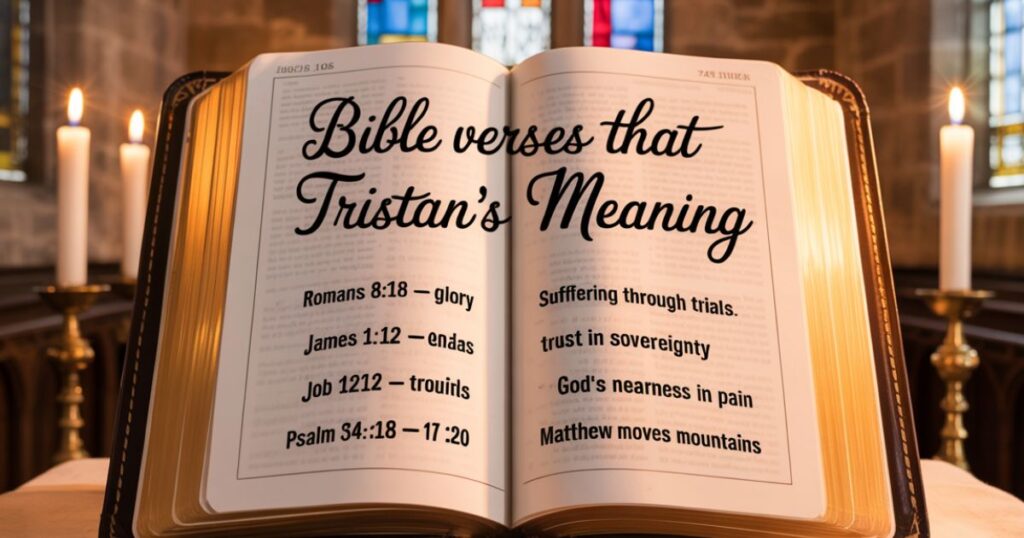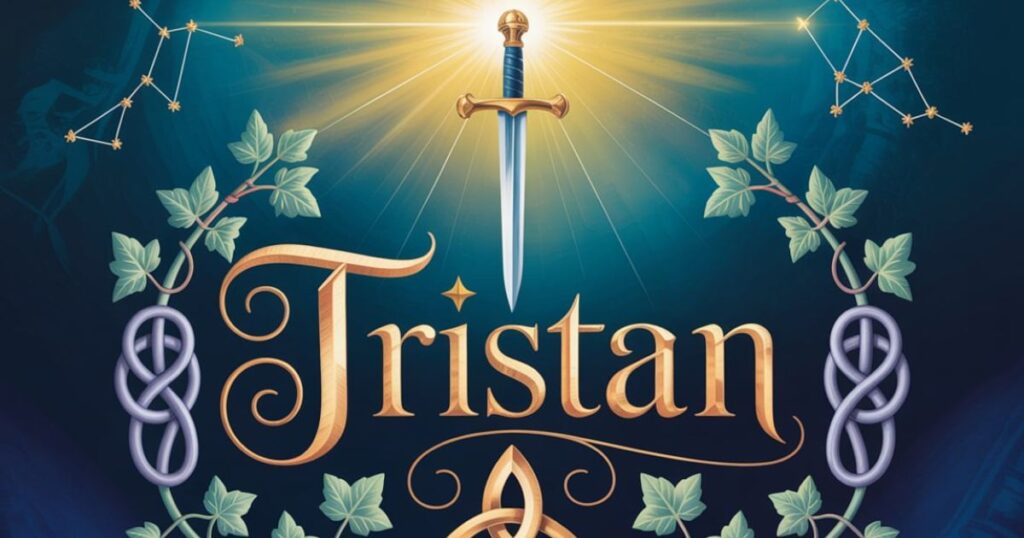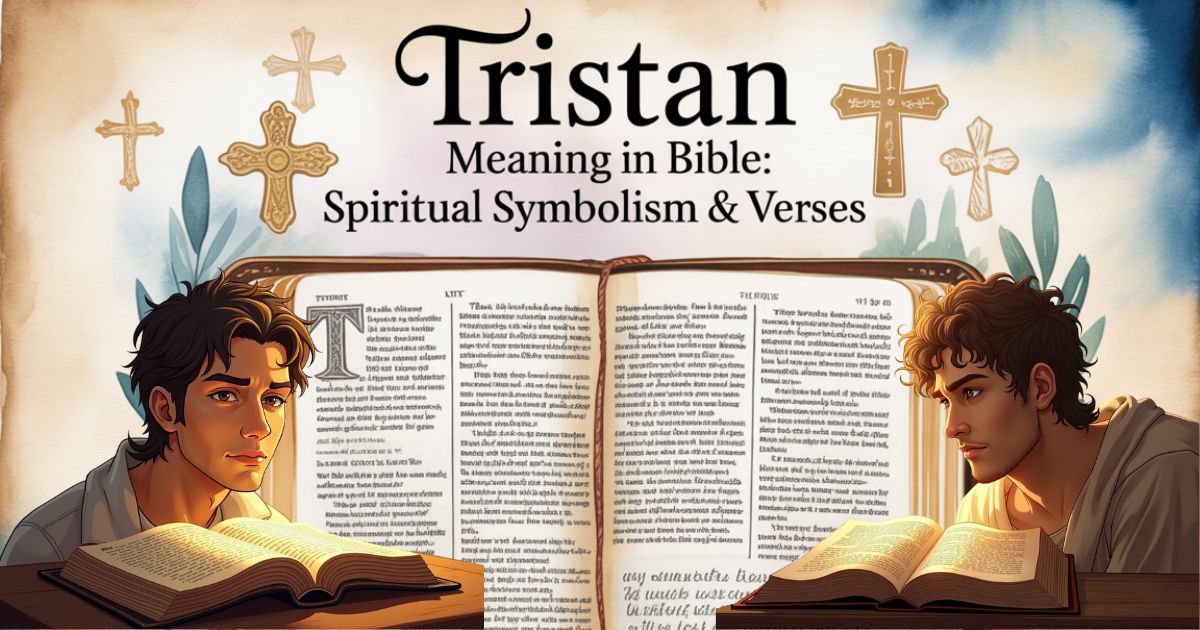Names whisper stories before we even speak. Tristan carries weight—a melody of both sorrow and courage. You won’t find it written in Scripture’s pages. Yet its essence mirrors biblical truths about faith, trials, and divine restoration.
Parents searching for faith-based baby names often wonder: does Tristan belong in a Christian home? Writers exploring symbolic name meanings ask: what spiritual lessons hide within these syllables? This article unveils the Tristan meaning in Bible context, showing how God transforms pain into purpose and brokenness into breakthrough.
Is Tristan Mentioned in the Bible?
Let’s address this directly: no biblical character bears the name Tristan.
Search Genesis through Revelation—you won’t locate it. Old Testament patriarchs never carried this name. New Testament apostles didn’t either. Yet its absence doesn’t diminish spiritual meaning.
The Latin root “tristis” means sorrowful or sad. This connects deeply with Scripture’s themes. Job suffered catastrophic loss yet worshiped God. King David poured raw anguish into Psalms. Apostle Paul endured beatings, shipwrecks, and imprisonment while spreading Christ’s message.
Biblical lessons from suffering saturate God’s Word:
- Psalm 30:5 promises joy follows weeping
- Romans 5:3–4 explains trials produce endurance and character
- James 1:12 declares blessing for those persevering
The Tristan name Bible meaning reflects this journey—sorrow turned to strength through divine grace. While lacking direct scriptural meaning of sorrow, the concept appears repeatedly. God specializes in turning sorrow to joy and transforming mourners into mighty warriors of faith.
Christians recognize that God’s purpose in suffering exceeds human understanding. Every trial, every tear carries redemptive potential. This makes Tristan’s essence thoroughly biblical, even without appearing in Scripture’s genealogies.
Tristan in the Bible: Biblical Significance and Spiritual Insights
Though not a biblical name, Tristan embodies profound Christian spiritual resilience. Let’s examine its spiritual interpretation through theological lenses:
| Aspect | Biblical Connection | Spiritual Application |
|---|---|---|
| Name Origin | Latin “tristis” (sorrowful) | Honest acknowledgment of human pain |
| Key Theme | Sorrow and redemption | God transforms every trial |
| Scriptural Echo | Psalm 30:5 – Joy comes morning | Temporary suffering, eternal glory |
| Character Building | Romans 5:3–4 – Trials forge endurance | Strength through faith develops |
| Christ Connection | Isaiah 53:3 – Man of Sorrows | Jesus understands our grief intimately |
| Promise | Psalm 30:11 – Mourning becomes dancing | Divine restoration guaranteed |
| Modern Application | Surrendering pain to God’s plan | Hope after pain transforms identity |
Spiritual Symbolism Breakdown
The Tristan Christian name meaning encompasses several transformative journeys:
Redemptive Suffering: Christianity doesn’t celebrate pain but recognizes God’s ability to redeem it. Christ’s suffering on Calvary demonstrates ultimate pain into purpose transformation.
Character Refinement: Just as fire purifies gold, trials and faith connection produces genuine believers. The Tristan name symbolism captures this refining process beautifully.
Prophetic Identity: Names in biblical culture carried prophetic weight. Though Tristan lacks direct scriptural meaning, parents choosing it declare: “God will transform my child’s struggles.”
Testimony Foundation: The most powerful ministries emerge from healed wounds. Those named Tristan can embody God’s transforming grace—living proof that faith and restoration conquer despair.
Origin and Etymology of Tristan

Understanding Tristan origin and etymology requires exploring two ancient linguistic streams:
Latin — Tristis (“sorrowful”)
The tristis Latin root meaning provides the name’s melancholic foundation:
- Tristis functioned as Latin’s primary sadness adjective
- Related noun tristitia meant grief or sorrow
- Romance language preservation: Spanish and French retain “triste” today
- Medieval Europeans used it marking individuals experiencing profound loss
- Christian thought connected it with godly sorrow producing repentance (2 Corinthians 7:10)
This meaning of Tristan in Latin emphasizes emotional honesty. Scripture never demands fake happiness. David’s Psalms overflow with authentic grief. The Latin root validates naming pain before healing begins.
Celtic — Drustan / Trystan (boldness, tumult)
The Trystan Celtic meaning adds courageous dimensions:
- Old Welsh roots show Drustan appearing in ancient manuscripts
- Breton variations spread across Celtic territories
- Concepts include boldness, action, dramatic destiny
- Medieval literature popularized it through Tristan and Isolde
- Warrior archetype: loyal, daring, tragically heroic
This Tristan name Celtic meaning balances inward sorrow with outward courage. Biblical principles mirror this—Job’s faith in pain combined vulnerability with unwavering trust.
Synthesis: Dual Nature Emerges
When examining Tristan etymology, scholars recognize beautiful tension:
Inward acknowledgment (Latin sorrow) meets outward boldness (Celtic courage). David exemplified both—writing honest laments while slaying Goliath. This dual nature makes Tristan profoundly Christian: authentic about struggles yet confident in God’s promises.
Bible Verses That Reflect Tristan’s Meaning

These Scriptures embody the Tristan meaning faith and hope journey:
Romans 8:18 – Suffering to Glory
"I consider that our present sufferings are not worth comparing with the glory that will be revealed in us."
Paul’s words capture hope after hardship perfectly. Temporary trials fade against eternal rewards. This verse screams Tristan’s essence—faith through trials produces unshakeable confidence.
James 1:12 – Endurance Through Trials
"Blessed is the one who perseveres under trial because, having stood the test, that person will receive the crown of life."
Perseverance in Scripture always precedes blessing. God doesn’t waste suffering—He rewards those standing firm. The Tristan spiritual meaning mirrors this truth: endurance through trials earns eternal recognition.
Job 1:21 – Trust in Sovereignty
"The Lord gave and the Lord has taken away; may the name of the Lord be praised."
Job lost everything—children, wealth, health—yet worshiped God. This represents ultimate trusting God in hardship. The biblical meaning of Tristan connects here: sorrowful yet courageous faith that refuses bitterness.
Psalm 34:18 – God’s Nearness in Pain
"The Lord is close to the brokenhearted and saves those who are crushed in spirit."
This brokenhearted Bible verse promises divine proximity during suffering. God doesn’t abandon mourners—He draws near. The Tristan name spiritual interpretation includes this comfort: God’s grace in suffering remains tangible and real.
Matthew 17:20 – Faith Moves Mountains
"Truly I tell you, if you have faith as small as a mustard seed... nothing will be impossible for you."
Size matters less than substance. Tiny faith produces miraculous results. This verse reflects Tristan’s Celtic boldness—courage in faith conquers impossible circumstances through divine power.
Summary: Scripture Validates the Journey
These Bible verses about sorrow and hope demonstrate God’s consistent pattern: sorrow turned into strength, trials becoming testimonies, pain transforming into purpose. The Tristan meaning in Scripture context shows how suffering never remains pointless when surrendered to God’s plan.
Spiritual Symbolism of the Name Tristan

Four transformative movements define Tristan’s spiritual insights:
Sorrow → Strength
Grief crushes initially. But God’s purpose in suffering includes building unshakeable inner fortitude.
2 Corinthians 12:9 declares: “My grace is sufficient for you, for my power is made perfect in weakness.” This strength in weakness Bible verse explains how God’s divine purpose behind suffering operates. Weakness becomes the canvas displaying His strength.
Hannah’s barrenness became Samuel’s birth. Joseph’s betrayal became Egypt’s salvation. Your tears water future ministry. This spiritual transformation represents core Christian interpretation of names like Tristan.
Trials → Trust
Life’s storms shake foundations violently. Yet they invite deeper trust in God dependence.
Proverbs 3:5–6 commands: “Trust in the Lord with all your heart and lean not on your own understanding.” This faith during suffering doesn’t require understanding—just obedience.
Peter walked on water focusing upward. He sank looking downward. Trials and faith connection strengthens when we fix our gaze on Christ rather than circumstances. This finding purpose in pain journey defines Christian maturity.
Pain → Purpose
Suffering seems senseless initially. But redemption in Christ guarantees nothing gets wasted.
Romans 8:28 promises: “And we know that in all things God works for the good of those who love him.” Notice it says “all things”—not just pleasant experiences.
The Tristan meaning and origin reflects this theological truth. Wounded healers help others uniquely. 2 Corinthians 1:3–4 explains we comfort others with comfort we’ve received. Your deepest scars become someone else’s hope. This purpose-driven name meaning captures Christianity’s redemptive core.
Faith → Restoration
Faith unlocks heaven’s restorative power completely.
Joel 2:25 declares: “I will restore to you the years that the locust has eaten.” This divine restoration promise shows God specializing in comebacks. Lazarus emerged from death. Blind Bartimaeus gained sight. The woman with the issue of blood found healing.
Psalm 30:11 celebrates: “You turned my mourning into dancing; you removed my sackcloth and clothed me with joy.” This joy after sorrow verses message defines the Tristan spiritual meaning—complete transformation from ashes into beauty.
Read This Post: Biblical Meaning of Number 24
Is It a Good Christian Name?
Absolutely. Here’s why Tristan makes an excellent Christian baby name:
Values It Embodies
- Perseverance: Standing firm when storms rage
- Redemption through struggle: Witnessing God transform pain
- Spiritual resilience: Refusing to surrender faith despite circumstances
- Authentic vulnerability: Honest about struggles while trusting God
Biblical Precedent
God examines hearts, not labels. 1 Samuel 16:7 reminds us: “The Lord does not look at the things people look at. People look at the outward appearance, but the Lord looks at the heart.”
Names lacking direct scriptural references can still honor God. Tristan reflects biblical themes—that’s what matters most.
Inspirational Impact
Every introduction becomes a testimony opportunity. Explaining the Tristan Christian meaning shares gospel truth: God transforms brokenness into breakthrough. This faith-based baby names choice creates daily reminders of God’s plan to redeem all things.
Tristan in Legends vs Christian Truth

Medieval literature distorted Tristan’s potential through the famous Tristan and Isolde legend:
The Legend’s Dark Themes
- Forbidden love overriding covenant commitment
- Betrayal destroying loyalty and trust
- Tragic ending without redemption hope
- Fate controlling rather than divine sovereignty
- Hopeless sorrow lacking transformative power
Christian Truth’s Redemptive Power
Christian truth vs legend reveals stark contrasts:
1 Corinthians 13 defines love as sacrificial, not selfish. Covenant strength transcends fleeting emotions. Romans 8:28 guarantees good emerges from every circumstance when surrendered to God.
The Tristan meaning in Bible context reclaims the name from tragedy:
- Loss becomes purpose through faith
- Broken stories transform into redemption narratives
- God’s power rewrites every ending
- Eternal hope outshines temporary suffering
Isaiah 61:3 promises exchanging beauty for ashes. Christians redefine cultural interpretations of Tristan, choosing biblical truth over medieval romanticism.
Conclusion
The Tristan name meaning in Bible context reveals profound spiritual truths. Though absent from Scripture’s pages, it embodies Christian spiritual resilience—sorrow turned into strength, trials transformed into trust, pain reshaped into purpose.
Choosing Tristan declares faith in God’s transforming grace. It proclaims that no struggle stays wasted, no tear falls unnoticed. Every person named Tristan carries potential for powerful testimony: living proof that hope after pain conquers despair.
Your story mirrors this journey. Whatever sorrow you’ve faced, whatever trials you’re enduring—God’s promises guarantee transformation. He specializes in turning mourning into dancing, weakness into strength, and brokenness into beautiful testimonies of His grace.
Tristan speaks of redemption through Christ—the ultimate story of suffering transformed into salvation. Let this name inspire courage in faith, deepen trust in God, and remind you that joy after sorrow always arrives for those who believe.
FAQ’s
What is the meaning of Tristan in the Bible?
Tristan doesn’t appear in Scripture, but its Latin meaning “sorrowful” reflects biblical themes like Psalm 30:5—joy comes after weeping. It represents perseverance through trials and hope in God’s promises.
What is the meaning of Tristan?
Tristan etymology combines Latin “tristis” (sorrowful) with Celtic “Drustan” (bold). This dual nature captures both emotional depth and courageous faith—perfectly mirroring Christian experience.
Is the name Tristan good?
Yes! Tristan embodies faith-based values: resilience, redemption, and spiritual strength. It’s widely accepted culturally while carrying deep Christian symbolism of transformation.
Does Tristan mean brave?
The Celtic roots suggest boldness and courage. Combined with Latin sorrow, it represents brave vulnerability—trusting God in hardship despite fear.
What is the Tristan meaning in Bible verse context?
Romans 5:3–4 and James 1:12 capture it perfectly: suffering produces perseverance, character, and hope. Tristan embodies this spiritual journey from trials to triumph.
Is the name Tristan in the Bible?
No. Scripture contains no character named Tristan. However, its spiritual meaning—faith through trials and divine restoration—saturates biblical narratives throughout both testaments.

Joshua is the faithful voice behind Biblegraces.com, sharing uplifting verses and spiritual insights to guide everyday life. His words inspire hope, peace, and a deeper walk with God. Through scripture and prayer, Joshua helps readers grow in faith and grace.








